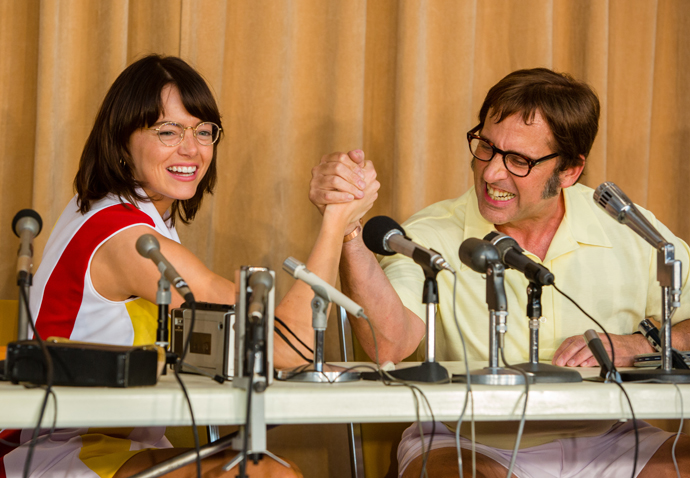Review: Battle of the Sexes
Champion performances from Emma Stone and Steve Carell in this retelling of the 1973 grudge match between tennis aces Billy Jean King and Bobby Riggs
Friday, 24th November 2017 — By Dan Carrier

Emma Stone as Billy Jean King and Steve Carell as Bobby Riggs
BATTLE OF THE SEXES
Directed by Valerie Faris and Jonathan Dayton
Certificate 12a
☆☆☆☆
MALE tennis players still earn more than their female counterparts. While the prize money the top tournaments offer have finally become equal, TV rights, sponsorship and the other ways top players earn cash away from simply prize money means there is still a very large gender pay gap.
So we are not, of course, there yet when it comes to parity – and as this brilliant film shows, the battle has been fought for some time.
Set in 1973, this film that manages to seamlessly marry comedy, drama and politics as if it were inviting viewers to peer down from high on the human race and point out what a strange species we really are. It tells the story of how tennis player Billie Jean King led the fight for equal pay – and how she played a tennis match against former champion Bobby Riggs for a cash prize to prove that the women’s game was just as good as the men’s.
Billy Jean King (Emma Stone) was the female number one and she got fed up of being told she was not worth as much as her male counterpart. Striking out with other female tennis stars, they set up their own Open tournament to show they could draw the same large crowds as men.
Meanwhile, former champion Bobby Riggs (Steve Carell) is going through a post-career crisis. Fighting a gambling addiction (one scene of him in a Gamblers Anonymous session is a film moment of 2017), he is also struggling to keep his marriage intact.
Adding to this maelstrom of a yarn is BJK’s personal dilemma – we learn she has fallen for her hairdresser, Marilyn (Andrea Riseborough).
Riggs was a popular figure – he won Wimbledon and other Grand Slam tournaments – and was only too happy to play the part of a chauvinist pig if it got him air time and fulfilled a need in his life for some action and a bet.
While King provides the politics and drama, Riggs provides the comedy – and Carell is superb. He creates a complex character, someone who is at home in a macho locker room but also, deep down, knows what is right. He plays a male bogeyman as an act.
While Stone and Riseborough will win plaudits for their strong performances, Carell offers depth to what could have been painted as just a one-dimensional, unreformed, 1970s pig.
Champion performances, equally.